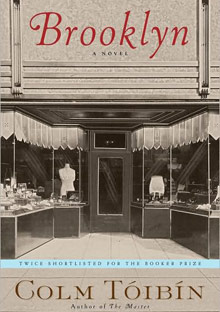The Irresistibles: 12 Lyrical, Luscious Reads
Brooklyn

PAGE 3
By Colm Tóibín
272 pages; Simon & Schuster
In Colm Tóibín's Brooklyn —a classical coming-of-age story, pure, unsensationalized, quietly profound—Eilis Lacey, unable to find suitable employment in small-town, post–World War II Ireland, ships off to Brooklyn for the promise of a job in a clothing shop, a room in an Irish-only boardinghouse, and the part-time friendship of her sponsor, the charismatic and persuasive Father Flood. In America Eilis discovers all manner of things unimaginable to those she leaves behind in Enniscorthy: Coney Island, Ebbets Field, heat that stays on all night in winter, and a soul-wrenching homesickness she can scarcely shake off.
Deftly, subtly, Tóibín catches the incremental openings this new life engenders in Eilis's mind and heart in sentences that both describe and imitate her growing expansiveness. After making love for the first time with her Italian boyfriend, Tony, Eilis thinks, "He seemed lost to the world. And this sense of him as beyond her made her want him more than she had ever done, made her feel that this now and the memory of it later would be enough for her and had made a difference to her beyond anything she had ever imagined."
There are no antagonists in this novel, no psychodramas, no angst. There is only the sound of a young woman slowly and deliberately stepping into herself, learning to make and stand behind her choices, finding herself able to withstand hardship (a storm at sea or the death of a loved one), growing into the wisdom that fate will render all our choices irrelevant in the end. — Pam Houston
272 pages; Simon & Schuster
In Colm Tóibín's Brooklyn —a classical coming-of-age story, pure, unsensationalized, quietly profound—Eilis Lacey, unable to find suitable employment in small-town, post–World War II Ireland, ships off to Brooklyn for the promise of a job in a clothing shop, a room in an Irish-only boardinghouse, and the part-time friendship of her sponsor, the charismatic and persuasive Father Flood. In America Eilis discovers all manner of things unimaginable to those she leaves behind in Enniscorthy: Coney Island, Ebbets Field, heat that stays on all night in winter, and a soul-wrenching homesickness she can scarcely shake off.
Deftly, subtly, Tóibín catches the incremental openings this new life engenders in Eilis's mind and heart in sentences that both describe and imitate her growing expansiveness. After making love for the first time with her Italian boyfriend, Tony, Eilis thinks, "He seemed lost to the world. And this sense of him as beyond her made her want him more than she had ever done, made her feel that this now and the memory of it later would be enough for her and had made a difference to her beyond anything she had ever imagined."
There are no antagonists in this novel, no psychodramas, no angst. There is only the sound of a young woman slowly and deliberately stepping into herself, learning to make and stand behind her choices, finding herself able to withstand hardship (a storm at sea or the death of a loved one), growing into the wisdom that fate will render all our choices irrelevant in the end. — Pam Houston



